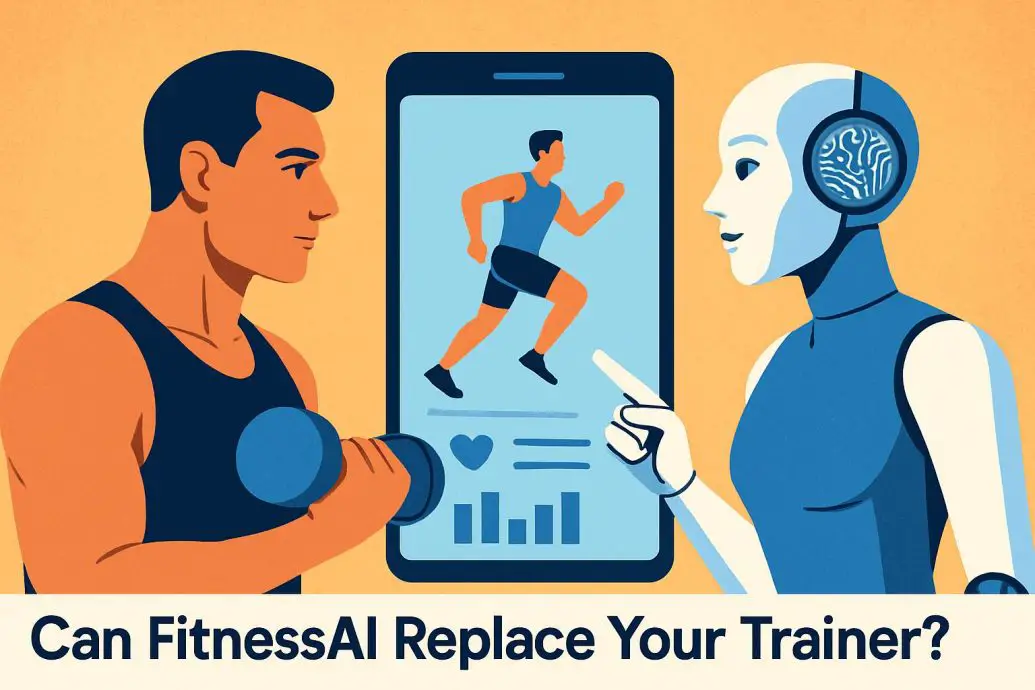Can FitnessAI Replace Your Trainer?
If you’ve ever wondered, “Can FitnessAI replace your trainer?”, you’re not alone. As demand increases for structured, affordable, and adaptive workout plans, apps like FitnessAI aim to modernize weight training through artificial intelligence. Built to optimize gym routines using data from millions of workouts, FitnessAI claims to match the capability of a human coach. But can an algorithm take the place of a certified trainer? This review explores how FitnessAI functions, compares it to competitors such as Fitbod, Future, and Centr, and helps you determine if it fits your fitness journey whether you’re a beginner, experienced lifter, or someone getting back into the gym.
Key Takeaways
- FitnessAI personalizes gym routines using AI-driven progressive overload and user input to increase strength consistently.
- It offers an affordable, self-guided option that structures workouts without requiring a personal trainer.
- Compared to Fitbod, Future, and Centr, FitnessAI specializes in strength training but lacks features for cardio and live support.
- Best suited for independent gym-goers who want data-guided lifting programs and long-term progress tracking.
What Is FitnessAI and How Does It Work?
FitnessAI is an artificial intelligence-powered workout application created for strength training. By analyzing over 10 million workout logs, its AI engine generates personalized routines based on progressive overload. The goal is to help users get stronger by adjusting weights, reps, and sets depending on their performance data.
This app focuses mainly on gym-based strength exercises. It provides routines that match your fitness goals and experience level. Essentially, it acts like a virtual personal trainer that updates your workouts regularly to make sure they remain effective and time-efficient.
Core Features Explained:
- Progressive Overload Engine: Increases your weights, sets, or reps systematically to support continuous muscle growth.
- Personalized Exercise Selection: Recommends exercises like squats, bench press, and rows informed by your feedback and history.
- Workout Tracking Dashboard: Monitors one-rep max progression and displays charts that reflect your performance.
- Minimal Setup, No Guesswork: After inputting your info once, the app designs a balanced weekly strength plan.
If you prefer structured gym plans without the trouble of designing your own or hiring a coach, FitnessAI could be a practical solution.
Who Should Use FitnessAI?
Not everyone needs personal coaching. FitnessAI is most effective for users who fall into one of these categories:
- Independent Lifters: You know the basics and want guidance with progression planning.
- Progress Trackers: You value data and want visual feedback on strength performance.
- Budget-Conscious Gym Goers: You’re looking for more structure than PDFs or online videos without the price of a coach.
- Travelers or Routine-Seekers: You want consistent routines that adjust to location and equipment availability.
Those who prefer quiet, focused gym sessions with clear training metrics will likely find the app valuable.
Comparing FitnessAI With Top Competitors
To evaluate how FitnessAI performs, let’s compare it to leading apps like Fitbod, Future, and Centr.
| Feature | FitnessAI | Fitbod | Future | Centr |
|---|---|---|---|---|
| Workout Focus | Strength training (gym-focused) | Strength, hypertrophy, general fitness | Custom full-body coaching | Wellness and functional fitness |
| AI Adaptability | Yes | Yes | No, uses human coach | No, follows fixed programs |
| Human Coaching | No | No | Yes, one-on-one | No |
| Progression Tracking | Strong (tracks 1RM) | Moderate (history logs) | Coach-managed tracking | Minimal |
| Monthly Pricing | $14.99 | $12.99 | $149 | $29.99 |
FitnessAI delivers high value for strength-focused users. If you believe in structured improvement and prefer automation, this app stands out. Meanwhile, those who need coaching support or well-rounded wellness may find alternative apps with human input more appealing.
User Experience: What It’s Like Using FitnessAI
It takes less than five minutes to get started. After entering your gender, age, experience level, goals, and the equipment available, you will receive custom workouts for the week.
What Users Like:
- Simplified interface that’s easy to operate
- Updated weight recommendations after every workout
- Progression built into core compound movements
- No need to set up workouts each day
Common Complaints:
- Lacks cardio and mobility routines
- Adapts slowly when adjusting for injuries or missed days
- Some advanced athletes feel stats are too basic
The app doesn’t include live coaching or video demonstrations. Still, when you provide feedback about exercise difficulty, it tweaks your weights accordingly. This makes it easier to follow a training plan that feels personalized without needing outside instruction.
How AI in FitnessAI Actually Works (Plain English)
The app uses machine learning, which means it learns over time based on your input. Unlike printable programs that remain the same, FitnessAI tracks how much weight you can lift, how you respond to the intensity, and whether something is too easy or too hard. Then, it updates your future workouts with the right amount of challenge.
To put it simply, the system acts like a detailed calculator that makes smart changes using your actual effort and progress patterns. You’re not just following a template. You’re using a tool that grows with you. This type of AI-human collaboration shows how digital tools can help users take ownership of their training routine.
Is FitnessAI Worth It?
For $14.99 per month, FitnessAI offers smart programming, tracking graphs, and auto-adjusted workouts. It does not offer form correction or motivation, but it gives strength-focused users a data-driven path forward. In contrast to in-person coaching that may cost $50 or more per session, this is a cost-effective option if your goals and focus are clearly on measurable progress in lifting.
If you’re more motivated by human interaction, you may prefer options like Future or working directly with a coach. But those looking for accessible automation may find that apps like FitnessAI and even emerging platforms that explore whether AI could replace humans are shaping the future of personal training technology.
